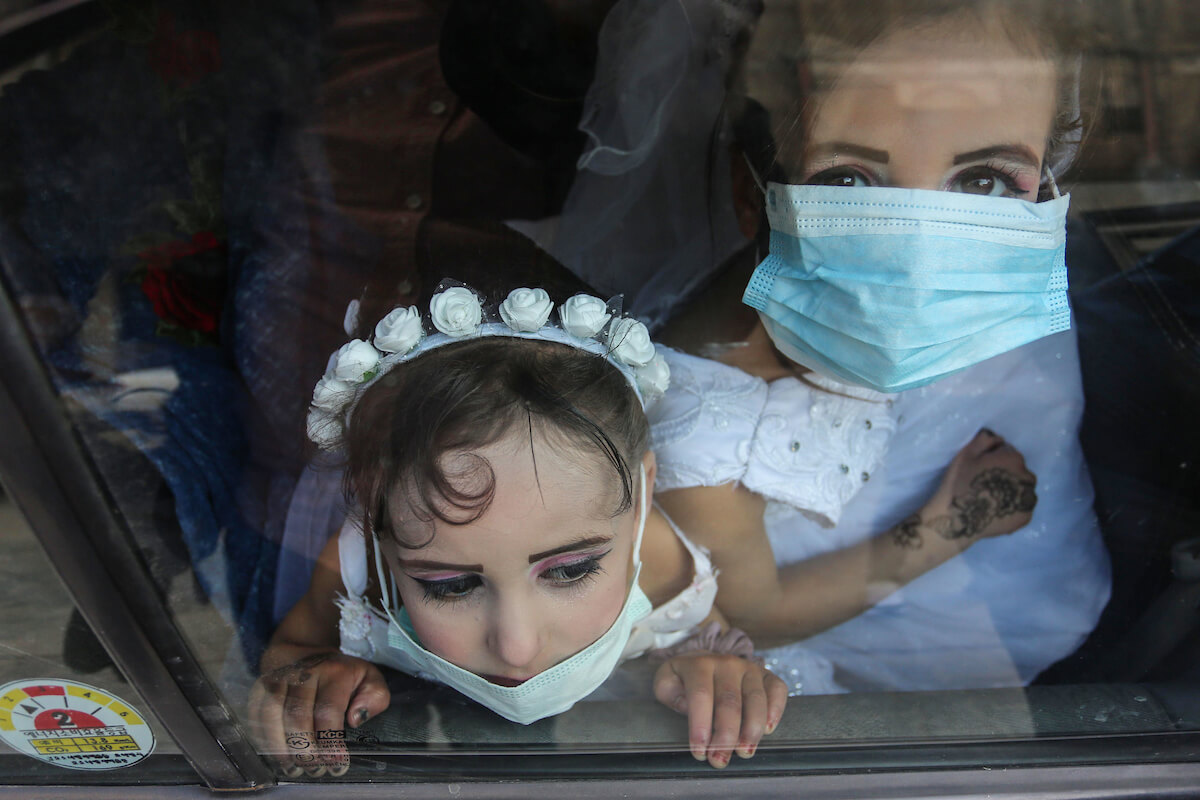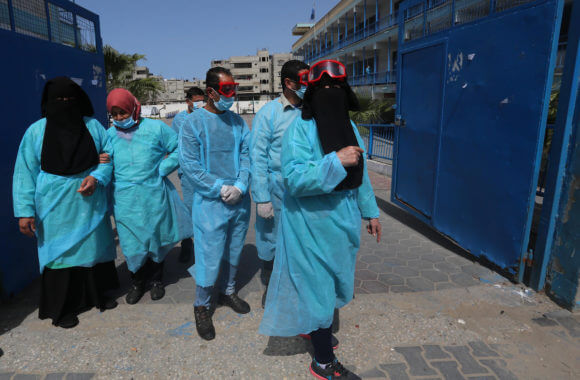The announcement that nine cases of COVID-19 have been confirmed in Gaza filled me with a new level of anxiety and despair. Gaza is at the beginning of the pandemic curve. With two million people crowded together in area six by twenty-five miles, 70 percent are refugees, 97 percent of the water contaminated and unfit for consumption, basic measures to prevent the spread of the virus will prove challenging. With above a 50 percent unemployment rate and a lack of supplies due to restrictions on the import of goods, it is impossible for families to stock up on essential items and shelter in place, let alone practice social distancing.
While I hunker down in my first world quarantine (with adequate food, electricity, clean water, a home, and phone calls from anxious friends), more vulnerable populations have a much more dangerous prognosis. Groups without clean water and hygiene products, the ability to socially distance from other contacts, and a functional first-world health care system, are facing much higher rates of disease and death. With competent, honest public health assessments, widespread testing and education, and strategic financial support, these outcomes can be mitigated and possibly improved.
Of course, our inadequately organized and funded U.S. health care institutions and governmental agencies are rapidly experiencing what can only be called third world challenges, (a lack of test kits, swabs, masks, personal protective gear, respirators, uninfected staff). This is only made worse by our deceitful and incompetent national leadership, with the notable exceptions of the head of the National Institute of Allergy and Infectious Diseases, Dr. Anthony Fauci, other reputable scientists, and health care and emergency workers. (And all the folks working to be sure we are fed.)
While the most vulnerable populations can easily be defined by poverty and lack of resources, this group encompasses a wide range of individuals from prisoners, asylum seekers on the border and in detention centers, to refugees living in congested camps, to people in occupied territories under siege like Gaza and countries under international sanctions like Iran.

There are louder and louder calls to free people from prisons and detention centers, many of whom are awaiting trial or are detained for lesser offenses, or trapped in the immigration nightmare, for their own safety as well as the safety of their guards. There are fewer voices on the international scale. We know what happens to the health of populations under crushing sanctions. The near-total financial and trade embargo on Iraq starting in 1990 resulted in high rates of malnutrition and death, a lack of medical supplies, and the breakdown of many modern facilities. Some scholars and international aid workers likened this to a crime against humanity or genocide– and that was without a pandemic. The rates of bribery and corruption exploded as Iraqis fought to survive and the society deteriorated into sectarian factions, a weakened government, and failed infrastructure and social supports.
When we look at the situation in Iran today, numbers as of March 25 indicate more than 27,000 people have been infected and more than 2,000 have died, although many experts calculate that the numbers are grossly underreported. After Trump withdrew from the international nuclear agreement in 2018, U.S. sanctions pushed an Iranian economy into deep recession, with rising inflation, skyrocketing food prices, and decreased access and outright shortages of medications, critical medical equipment, and massive financial stresses on the nearly universal health care coverage system.
Gaza suffers from a thirteen-year siege, a barely-functional health care system subjected to repeated military attacks and an inability to obtain adequate rebuilding supplies, a decimated civil infrastructure, and shortages of waste disposal, electricity, and fuel. The Gazans are also uniquely vulnerable due to their declining levels of health in the face of poverty and substandard health care. The World Health Organization has warned that large numbers of COVID-19 patients will cause a “collapse” of Gaza’s health system.
Clearly, this is a time of grave urgency and the need for forward, global thinking. To survive as a planet, we need to take care of each other, it’s as basic as that.
While conspiracy theories, incompetency, and complacency are rampant (this is not a “Wuhan virus” or a “bioweapon”), now is not the time to listen to racist, xenophobic, or free market advice. This virus knows no boundaries and the people in charge need to listen to and share scientific data, take advice from other countries, mobilize industries to produce the products we need, and plan on an international scale how to limit the viral spread and distribute needed resources.
Basic to that is lifting the sanctions on Iran and the siege of Gaza in the name humanity and decency. This is not a war; it is a medical and public health emergency on a global scale.



ALICE ROTHCHILD- “(this is not a … “bioweapon”)”
What makes you so sure? The US has a long history of biowarfare and the COVID-19 virus is an ideal pretext for restructuring society. Surely the response has been draconian in the extreme, not in keeping with historical precedent, similar to 911 but only more so.
As for Gaza, reduced immunity due to deprivation will be a significant factor, however, most fatalities occur in the elderly with pre-existing conditions, hence, the relatively youthful age of Gaza should be a defense in and of itself.
https://www.aljazeera.com/news/2020/03/coronavirus-doctor-warns-incoming-disaster-gaza-200325195816841.html
“Coronavirus: Doctor warns of ‘incoming disaster’ in Gaza,” Al Jazeera, March 25, 2020
“Palestinian-Canadian physician Tarek Loubani says only a suspension of blockade of Gaza will help in COVID-19 crisis.” by Jillian Kestler-D’Amours
Montreal, Canada – “For years, Dr Tarek Loubani has been guided by a simple principle: all patients, no matter where they live, should have equal access to high-quality healthcare. But it is obvious to the Palestinian-Canadian emergency room doctor that this ideal is not yet a reality.
“I practised in Canada and I practised in Gaza, and I could see that my patients in Gaza weren’t receiving the same care,’ he told Al Jazeera this week, as the blockaded Palestinian territory confirmed its first two cases of the novel coronavirus.
“The global coronavirus pandemic has thrust stark global disparities in access to healthcare and medical equipment into the spotlight, as some countries are being ravaged while others are succeeding so far in staving off a crisis.
“The Gaza Strip, one of the most densely populated places in the world, is expected to be among the hardest-hit areas, as experts fear chronic shortages and an already strained healthcare system will exacerbate the spread of the virus.
“Medical workers in Gaza are preparing for the worst, said Loubani, who spent two weeks working there last month. ‘People were so terrified because they knew that they were living in a powder keg,’ he said. ‘And even these two cases represent such an incoming disaster.’
“3D printing supplies”
“An emergency room physician in the Canadian province of Ontario, Loubani has worked with colleagues in Gaza to address some of the problems plaguing the healthcare system for several years.
“In 2015, he raised over $206,000 ($300,000 Canadian) to erect solar panels atop a handful of hospitals across the Palestinian territory and provide a more consistent supply of electricity amid frequent power cuts. He also founded the Glia Project, an open-source charity that produces 3D-printed medical equipment at a low cost. The group has helped deploy 3D-printed stethoscopes and tourniquets in Gaza.
“For COVID-19, Glia has shared production plans for medical face shields, which front-line medical workers use when they are treating patients.
“The face shields, which are being produced for use in Canadian facilities amid concerns that supplies may run out, are made with mylar and elastic, and they cost seven dollars per unit to produce. They are also reusable, Loubani said.
“He said the equipment would help plug a gap in Canada, which is otherwise well-equipped to respond to the coronavirus outbreak and where the government has mobilised various industries to manufacture supplies. But Loubani conceded that face masks alone would not drastically change the reality of COVID-19 in Gaza.
“‘Face shields in Canada are great because that’s the thing that’s missing. But in Gaza, it’s not the thing that’s missing. It’s like a bridge, but there’s no ends on either side of this bridge.’
“‘Nightmare scenario'”
“Under an Israeli-Egyptian blockade for over a decade, the Gaza Strip faces a dire humanitarian crisis and its medical facilities are stretched thin. Many Palestinians in the territory do not have regular access to electricity, clean water or sanitation, a reality that could exacerbate the outbreak.
“Serious concerns have also been raised that Gaza does not have enough coronavirus testing kits to meet the needs of the local population, which numbers nearly two million people.
“‘The hospitals are not yet really ready,’ said Matthias Schmale, director of Gaza operations for the UN Palestinian refugee agency (UNRWA) on March 20, just days before the first coronavirus cases were reported.
“Israeli human rights organisation B’Tselem also said on March 23 that the spread of the coronavirus in Gaza would be ‘a massive disaster resulting entirely’ from the conditions created entirely by the Israeli blockade.
“‘A failing healthcare system, extreme poverty, dependence on humanitarian aid, dysfunctional infrastructure and harsh living conditions that compromise public health … combine with overcrowding to form a nightmare scenario,’ the group said in a statement.
“Loubani said that in February, when he was last in Gaza, physicians did not have enough gloves, face shields, or M95 protective masks, and many hospitals did not have respirators. That equipment is key to combatting the virus, which makes it difficult for patients to breathe and often requires their intubation.
“‘The most frustrating part about the health system in Gaza is [that] we actually know the answer, and the answer is an immediate end to the blockade, even if for a short period so that we can get through this crisis,’ Loubani said.
“‘There’s some amount of the coronavirus that’s inevitable in Gaza, but the disaster we’re about to watch unfold is not inevitable.'”
“While conspiracy theories, incompetency, and complacency are rampant (this is not a “Wuhan virus” or a “bioweapon”)…”
Before you start about “conspiracy theories”, you should be required to bring solid proof that this is not a bioweapon. The few published screeds by “authoritative” bodies only advance some vague logical reasoning. That is not evidence. There are a number of obvious open questions that allow keeping the biowarfare theory open.
Beyond words:
https://www.haaretz.com/opinion/.premium-israeli-health-minister-s-cure-for-covid-19-the-messiah-1.8703719
“Israeli Health Minister’s Cure for COVID-19? The Messiah” by Netta Ahituv, Haaretz, March 24, 2020
“’We are praying and hoping that the Messiah will arrive before Passover, the time of our redemption. I am sure that the Messiah will come and bring us out as [God] brought us out of Egypt. Soon we will go out in freedom and the Messiah will come and redeem us from all the troubles of the world.’
“This remark was made by Health Minister Yaakov Litzman last week, after Yaniv Kalif of the Hebrew-language news website Hamal asked him whether Israelis will be forced to remain under lockdown until the holiday, which begins April 8. Litzman’s ignorant answer was not met with uproar.
“Is it reasonable for a religious man, a member of the Gur Hasidic community, one of the most conservative Jewish communities in the world, to head the Health Ministry as it faces the biggest crisis Israel has ever known?
“It goes without saying that the solution to this crisis will, of necessity, come from science, an area of human knowledge to which Gur Hasidim are less than sympathetic.
“The truth is that Litzman’s unfortunate comment flew under the radar because Israel has always followed a twisted hierarchy: Religion is superior to secularism, and religious actions are more important than secular ones.
“In normal times, this narrative leads to infuriating nationwide directives: We are subordinate to kashrut laws that raise the cost of living and make us captive to corrupt kashrut supervisors. Two parties prohibit half of the population from running for the Knesset on their slates, and not even the High Court of Justice has been able to force them to do so. For these same religious reasons, civil marriages are prohibited in Israel.
“Even in times of crisis, religion rules. Secular group activities, including those with fewer than 10 participants, are shut down without a second thought and without asking too many questions. No studies, no extracurricular activities, no public readings, no foreign-language courses, no cultural events. But group worship is still kosher. Not even data showing that over a third of the coronavirus patients who were diagnosed with the illness last weekend had visited synagogues made a difference.
“In Israel today, Jewish collective prayer outweighs even pikuah nefesh, the principle in Jewish law that the preservation of human life overrides virtually any religious rule.
“Perhaps it is no surprise that Litzman believes relief will come from the Messiah, but it is surprising to find out that the Israel Police also believe this. According to an internal police document obtained by Haaretz (Josh Breiner and Ido Efrati, March 22), officers had orders to let up to 20 people gather in a synagogue for worship, despite Health Ministry emergency regulations capping public gatherings at 10 people – as long as they are secular, presumably.
“The police responded that the document was only a draft and stressed that the 20-person clause refers to religious ceremonies such as weddings and funerals rather than regular services.
“In one of the last speeches he gave before his death, Douglas Adams, author of ‘The
Hitchhiker’s Guide to the Galaxy’ and ‘Last Chance to See,’ said: ‘Religion … has certain ideas at the heart of it which we call sacred or holy or whatever. … [W]e are used to not challenging religious ideas. … Yet when you look at it rationally, there is no reason why those ideas shouldn’t be as open to debate as any other, except that we have agreed somehow between us that they shouldn’t be.’
“Now, more than ever, we have an opportunity to challenge religious assumptions and open them up to debate, just as we do with secular activities. These are matters of life and death, as well as intolerable discrimination that has gone on for too long.
“Unfortunately, the likelihood of this happening is less than that of the Messiah coming to save us from the coronavirus before the start of Passover.”